Reclaiming the stories of women on screen
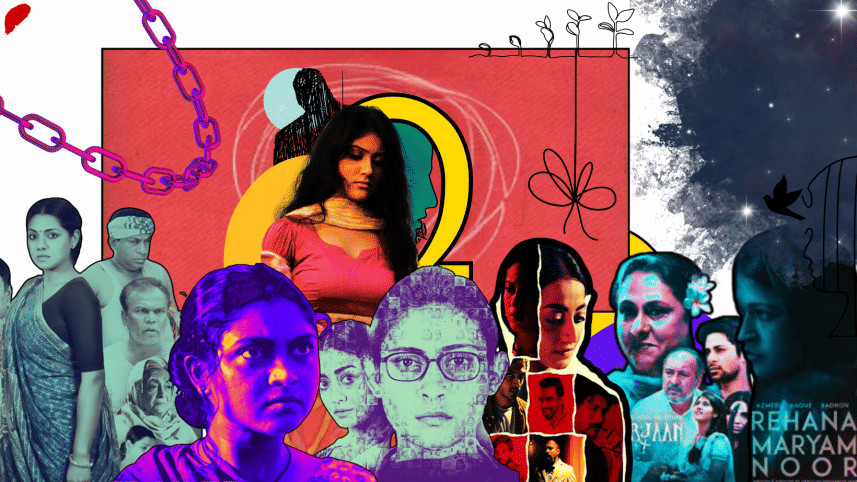
The intransigent and often vicious treatment toward women across the board, the world, and our very existence is a debilitating fact that indisputably remains more pronounced for some than most. One can imply that it is less normalised in the context of the broader, more enlightened community. Still, there is no question that gender-based violence seethes and thrives around junctures where people, especially women, are at their most vulnerable.
However, the worst of it all is the perpetual implementation of violent acts against women in more ways than one—with voices raised against such atrocities almost always falling short in number.
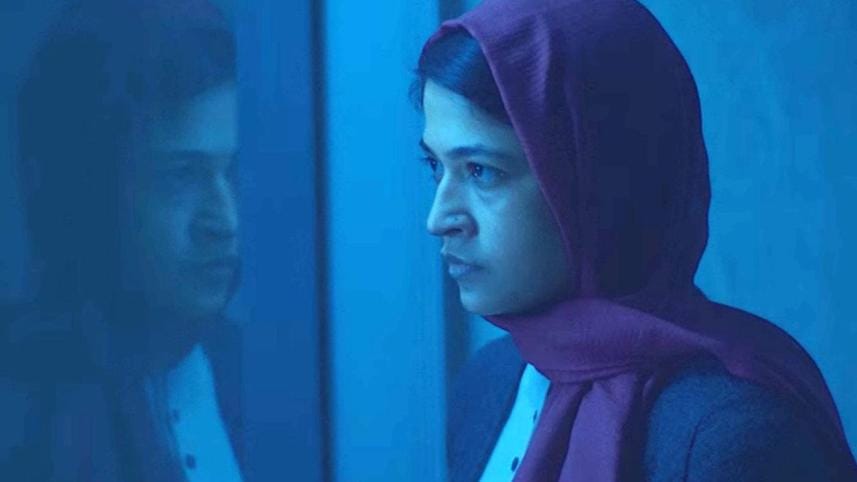
Bangladeshi filmmakers have been employing their work to voice the need for victims of gender-based violence to own their narrative.
The depiction of violence against women through varied mediums, including films or shows, plays a pivotal part in people being able to analyse and assess the assortments of brutality—even more so for those who fail to recognise the undue tribunals whilst experiencing it for themselves. These harsh blows are not just delivered physically but verbally, psychologically, sexually, and even socioeconomically. Then again, the depiction of raw or perceivable violence is not always capitalised perhaps because of the existence of strict censorship policies against showcasing such representations worldwide; not wanting to receive backlash from conservative groups; not having sufficient insight, grasp, or sensibility on the portrayal of violence against women; and the unfathomable stigma associated with being victims of violence.
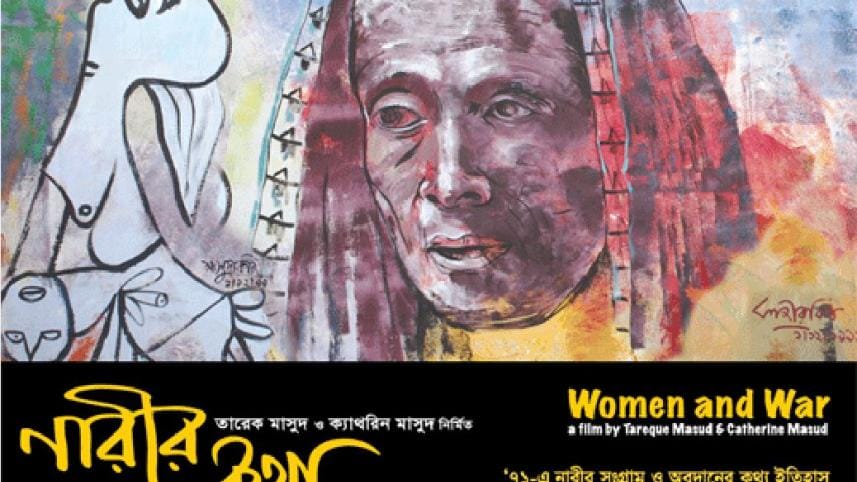
The frameworks of portrayals of gender-based violence in our local productions have been birthed from the need to give voice to the oppressed Biranganas (war heroines)—as portrayed through several films or dramas throughout the years.
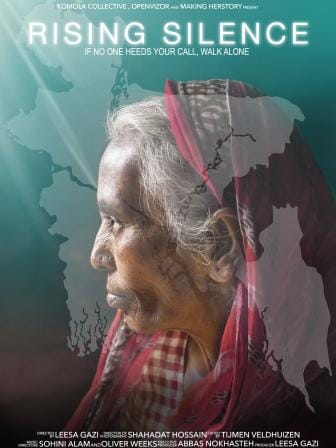
The pioneering filmmaker Tareque Masud has inevitably become one to be named when mentioning the portrayal of the everyday woman in films. The documentary "Narir Kotha" (Women and War) from the year 2000, directed by Tareque Masud and his wife Catherine Masud, is a mouthpiece for women who were subjugated to dual oppression during the Liberation War—providing weight to a second-wave feminist theory that rings true to date.
Another documentary, "Rising Silence" (2018) by Leesa Gazi, tells the story of rape survivors still struggling to fight to obtain dignity. In times of war or unprecedented chaos, women are inevitably and doubly subjugated—by the patriarchal system and men's individual treatment of women.
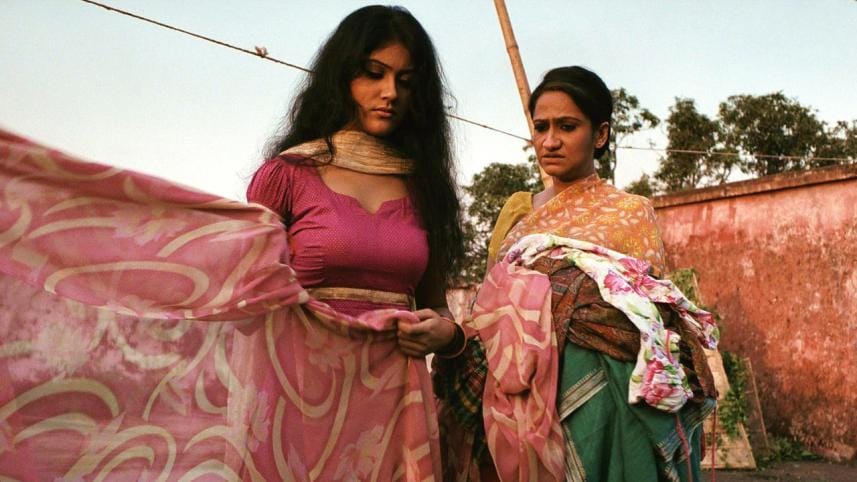
Films like "Meherjaan" (2011) by Rubaiyat Hossain and "Shongram" (2014) by Munsur Ali, among others, play a landmark role in representing women who were once victims of war crimes. The women in these films navigate the trenches of both love and war, while becoming sufferers themselves.

"Meherjaan," "Rising Silence," and "Narir Kotha" have particularly been credited as being bold by audiences and critics alike. This, in hindsight, can be attributed to women being either in charge of the film production or co-directing a documentary.
The representation of marital woes experienced by victims of domestic violence is a monumental aspect that requires awareness. Local productions like "Haldaa" (2017) by Tauquir Ahmed, "Made in Bangladesh" (2019) by Rubaiyat Hossain, "Kuhelika" (2023) by Samiur Rahman, and "Sabrina" (2022) by Ashfaque Nipun, among others, take the plunge to address varied forms of subjugation of women within the supposedly safe confines of being married.
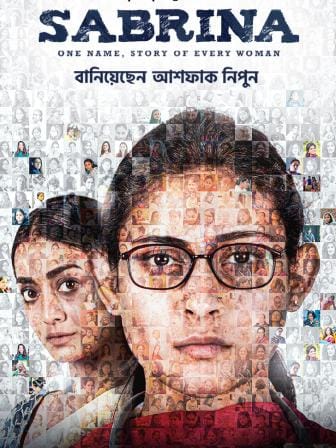
"Kuhelika", directed by a male director, displays a rather vengeful take on a victim of domestic abuse. The character Nandini (Nazia Haque Orsha) in "Kuhelika" ends up murdering her abusive husband while she attempts to protect herself. This stance, however, reinvigorates her desire to live peacefully with her brother and his daughter. The man she had chosen to marry turned out to be duplicitous in nature, and she suffered the consequences of having married him in spite of knowing him as a different man before their marriage.
"Sabrina", on the other hand, is the story of a conniving, pathetic, and desperate man who became the reason behind the incidental raping and then burning of the character Sabrina (Nazia Haque Orsha). Although "Sabrina" ends on an incomplete note, the task of finding out the true identities of the culprits behind Sabrina's inception is undertaken by her namesake, played by Mehazabien Chowdhury. The constant vilification of the average woman is a towering aspect of this series.

Films like "Made in Bangladesh" and Abdullah Mohammad Saad's "Rehana Maryam Noor" (2021) flaunt the value of sisterhood and support victims inevitably need in order to sustain their emotional and mental health. The respective main characters, Shimu (Rikita Nandini Shimu) and Rehana (Azmeri Haque Badhan), innately support victims in need of assistance. They do so for their need to demand justice, regardless of the costs, and their personal lives often take the toll of their actions. Shimu ends up having to fight with a loving husband to run to do right by the side of her colleague sisters who work alongside her at a garments factory. Rehana, on the other hand, fights the institutional system and deceitful allegations to stand for her beliefs.

Interestingly, director Saad takes the help of publicly shaming the central character to illustrate her devotion to the cause, while Hossain relies upon the central character eagerly seeking support for the betterment of every other woman being oppressed by the capitalistic system of extortion.
When all is said and done, representations of victims of gender-based violence need to be heard, acknowledged, and seen on all fronts. Regardless of the gender of filmmakers or creators, the especially true stories of victims need to always be out there to give them the dignity of knowing that it was never their fault.




 For all latest news, follow The Daily Star's Google News channel.
For all latest news, follow The Daily Star's Google News channel.
Comments